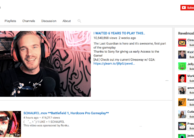Newt Gingrich is also a frequent guest on The Daily Show. Gingrich, the former Speaker of the House of Representatives, is a prominent vocal conservative and regular commentator on Fox News programs. Gingrich is a regularly mocked political figure on The Daily Show, and a statement of his was even used in a video segment earlier in the very episode in which Gingrich was being interviewed.
The Daily Show with Jon Stewart: Newt Gingrich Interview
As with the Huckabee interview, the level of discourse is not very extreme and the conversation is intricate and thought-provoking. Although Stewart and Gingrich make some jabs at each other, with Stewart mocking Gingrich quite overtly at times, they are able to substantively discuss the current political situation, the dilemma of terrorism and constitutional rights, and the debate about military tribunals versus the civilian court system for terrorists. Despite the strong opinions on both sides, the interview is not a shouting match, but a mere conversation.
While most of the interview is a spirited debate between the two, there is one particular moment where Stewart mockingly criticizes Gingrich. When questioned by Stewart about his characterization of the Obama administration’s position on terrorist rights, Gingrich states “Putting the rights of terrorists legally ahead of figuring out how to save Americans is seen by most Americans to be a fairly radical redefinition.” Stewart, though, rejects Gingrich’s framing of the Obama administration’s view and his characterization of the policy as ‘radical,’ claiming that Gingrich framed the issue in a “very emotional” manner sarcastically adding that Gingrich “[should not] let reality get in the way.” While Stewart’s mockery momentarily detracts from the quality of the conversation, it emphasizes his disconcert about the provocative rhetoric that has been employed by Gingrich and many other political figures – on both sides of the issue. In order to decrease misleading rhetoric in serious political and social issues, Stewart questions the use of such characterizations.
The series of Jim Cramer interviews, the Huckabee interview, and the Gingrich interview all exemplify the quality of serious discourse for which The Daily Show strives. The latter two convey Stewart’s desire to increase debate over controversial issues in a rational and less partisan fashion. Two additional interview examples below offer slightly different approaches that Stewart has taken to produce high quality interviews.
John Yoo is a former law professor and a constitutional lawyer. Yoo worked for the United States Department of Justice under President George W. Bush and, as the Deputy Assistant Attorney General, drafted what became known as the “Torture Memos” – a set of legal documents that expanded executive prerogative to allow for enhanced interrogation techniques on enemy combatants. In a twenty-six minute three-part interview, Stewart questioned Yoo extensively in an attempt to unravel and comprehend the complexities of Yoo’s justifications for the enhanced interrogation techniques.
This was by no means a relaxed and humorous interview. Stewart challenged the logic of the justification for the enhanced interrogation techniques, often exploring with Yoo complicated topics such as constitutional and international law, executive authority, torture, past presidential actions, the War Powers Act, checks and balances, and Yoo’s own role in the process. Yoo was an expert in constitutional law, while Stewart, having no legal education or experience, had merely read a few legal briefs in preparation – an obvious disparity between the two men’s knowledge and background on the issue. It was an unusual situation, with Stewart not being able to openly debate many of the legal technicalities. To compensate, Stewart attempted to discern the justifications as the interview progressed, pointing out inconsistencies in the thought process when possible.
In the case of Marc Thiessen, a political commentator and former speechwriter for President George W. Bush, Stewart had a much more heated debate regarding torture, the lawful representation of detainees, the complex nature of national security and safety, and the morality of the enhanced interrogation techniques. Thiessen and Stewart each vied for control of the argument throughout the thirty-two minute extended interview.
In an effort to hold the Bush administration accountable for its highly controversial interrogation policies, Stewart, constantly challenged the Thiessen’s arguments. Stewart, as he did with Jim Cramer, utilized the Internet as a forum for discussion and contemplation. Instead of being constrained by a strict television airtime contract, Stewart continued the discussion in extended interview segments so that a more complex and intricate conversation regarding the legality of enhanced interrogation techniques and executive power during wartime could ensue. Ross Douthat, a frequent contributor to The New York Times, remarked that “Stewart’s series of debates on torture and interrogation policy, in particular — featuring John Yoo and Marc Thiessen, among others — have been more substantive than anything on Fox or MSNBC.” Despite the legal complexities of both discussions, Stewart contributed greatly to the American democracy by bringing extensive public scrutiny to controversial national security policies.
Furthermore, though the tensions were much higher with Thiessen, Stewart concluded the interview with Yoo on better terms with the following statement:
“I always like to think that it’s very easy to demonize people and actions, and it’s always important to sit in front of them and have as honest a discussion and as real a discussion as you can… I hope that people take away from it at least a certain human struggle that everybody faces in these difficult situations to do what they think is best for the country, whether there are disagreements or not, and not to demonize those actions on one side or the other – because that is way too easy these days… I disagree with certain things, and I appreciate you coming by to discuss them.”
This reasonable appeal for civility represents the general theme of the majority of the interviews that Stewart conducts. Whether it is Dick Armey, the leader of the Tea Party movement, or Admiral Mike Mullen, Chairman of the Joint Chiefs of Staff, Stewart seeks to have a candid and open conversation with those with whom he agrees and disagrees address the “human struggle that everybody faces” at one time or another. Civility is a constant theme of The Daily Show, and Stewart attempts to improve the quality of discourse and move beyond the strong sentiments that regularly pervade controversial social, political, and moral debates.Continued on Next Page »
1.) Baym, Geoffrey. “The Daily Show: Discursive Integration and the Reinvention of Political Journalism.” Political Communication. 2005. 22: 3, 259-276.
Brewer, Paul R. and Emily Marquardt. “Mock News and Democracy: Analyzing The Daily Show.” Atlantic Journal of Communication. Lawrence Erlbaum Associates, Inc. 2007. 15:4, 249-267.
4.) “Remembering Anna.” The Daily Show with Jon Stewart. Comedy Central. February 12, 2007. Web. October 26, 2010. <http://www.thedailyshow.com/watch/mon-february-12-2007/remembering-anna>.
5.) “Shut Up Mark Sanford.” The Daily Show with Jon Stewart. Comedy Central. July 12, 2009. Web. October 26, 2010. <http://www.thedailyshow.com/watch/thu-july-2-2009/shut-up--mark-sanford>.
6.) “The Wedding of the Century of the Millennium.” The Daily Show with Jon Stewart. Comedy Central. August 2, 2010. Web. October 26, 2010. <http://www.thedailyshow.com/watch/mon-august-2-2010/wedding-of-the-decade-of-the-century-of-the-millennium >.
“Headlines Duke Lacrosse Rape Allegations.” The Daily Show with Jon Stewart. Comedy Central. April 18, 2006. Web. October 26, 2010. <http://www.thedailyshow.com/watch/tue-april-18-2006/headlines---duke-lacrosse-rape-allegations>.
9.) “Headlines Duke Lacrosse Rape Allegations.” The Daily Show with Jon Stewart. Comedy Central. April 18, 2006. Web. October 26, 2010. <http://www.thedailyshow.com/watch/tue-april-18-2006/headlines---duke-lacrosse-rape-allegations>.
10.) “Journalism, Satire or Just Laughs? ‘The Daily Show with Jon Stewart,’ Examined.” Pew Research Center’s Project for Excellence in Journalism. N.p., May 8, 2008. Web. October 26, 2010. <http://www.journalism.org/node/10953>.
11.) Who the f@#k is that guy? – Political Experts.” The Daily Show with Jon Stewart. Comedy Central. October 22, 2008. Web. October 28, 2010. <http://www.thedailyshow.com/watch/wed-october-22-2008/who-the-f--k-is-that-guy----political-experts>.
13.) “Hi Tech News Coverage.” The Daily Show with Jon Stewart. Comedy Central. January 9, 2008. Web. October 28, 2010. <http://www.thedailyshow.com/watch/wed-january-9-2008/hi-tech-news-coverage>.
14.) “Speech Therapy.” The Daily Show with Jon Stewart. Comedy Central. January 28, 2010. Web. November 4, 2010. <http://www.thedailyshow.com/watch/thu-january-28-2010/speech-therapy---post-racial>.
15.) “CNN Leaves It There.” The Daily Show with Jon Stewart. Comedy Central. October 12, 2009. Web. November 1, 2010. <http://www.thedailyshow.com/watch/mon-october-12-2009/cnn-leaves-it-there>.
17.) “CNN Leaves It There.” The Daily Show with Jon Stewart. Comedy Central. October 12, 2009. Web. November 1, 2010. <http://www.thedailyshow.com/watch/mon-october-12-2009/cnn-leaves-it-there>.
18.) “MSNBC Left Behind.” The Daily Show with Jon Stewart. Comedy Central. October 11, 2010. Web. November 3, 2010. <http://www.thedailyshow.com/watch/mon-october-11-2010/msnbc-left-behind>.
19.) “Keith Olbermann’s Name Calling.” The Daily Show with Jon Stewart. Comedy Central. January 21, 2010. Web. November 4, 2010. <http://www.thedailyshow.com/watch/thu-january-21-2010/special-comment---keith-olbermann-s-name-calling>.
20.) “Speech Therapy.” The Daily Show with Jon Stewart. Comedy Central. January 28, 2010. Web. November 4, 2010. <http://www.thedailyshow.com/watch/thu-january-28-2010/speech-therapy---post-racial>.
21.) “Fox News.Com.” Fox News Network, LLC. November 4, 2010. 2010. <http://www.foxnews.com/>.
22.) “For Fox Sake.” The Daily Show with Jon Stewart. Comedy Central. October 29, 2009. Web. November 4, 2010. <http://www.thedailyshow.com/watch/thu-october-29-2009/for-fox-sake->.
24.) “Anchor Management.” The Daily Show with Jon Stewart. Comedy Central. March 3, 2010. Web. November 4, 2010. <http://www.thedailyshow.com/watch/wed-march-3-2010/anchor-management>.
“Gretchen Carlson Dumbs Down.” The Daily Show with Jon Stewart. Comedy Central. December 8, 2009. Web. November 6, 2010. <http://www.thedailyshow.com/watch/tue-december-8-2009/gretchen-carlson-dumbs-down>.
“Sean Hannity Uses Glenn Beck’s Protest Footage.” The Daily Show with Jon Stewart. Comedy Central. November 10, 2009. Web. November 6, 2010. <http://www.thedailyshow.com/watch/tue-november-10-2009/sean-hannity-uses-glenn-beck-s-protest-footage>.
33.) “Sean Hannity Apologizes to Jon.” The Daily Show with Jon Stewart. Comedy Central. November 12, 2009. Web. July 16, 2011. <http://www.thedailyshow.com/watch/thu-november-12-2009/sean-hannity-apologizes-to-jon>.
34.) “Are You Ready For Some Midterms? – MSNBC’s Political Narrative.” The Daily Show with Jon Stewart. Comedy Central. September 9, 2010. Web. November 6, 2010. <http://www.thedailyshow.com/watch/thu-september-9-2010/are-you-ready-for-some-midterms----msnbc-s-political-narrative>.
35.) “Kurtz criticizes Hannity's "careful editing" of Obama speech: "Isn't that kind of editing, what's the word, deceptive?" Media Matters For America. September 12, 2010. Web. November 6, 2010. >.
36.) “Bernie Goldberg Fires Back.” The Daily Show with Jon Stewart. Comedy Central. April 20, 2010. Web. November 6, 2010. <http://www.thedailyshow.com/watch/tue-april-20-2010/bernie-goldberg-fires-back>.
37.) “Top TV Feuds: Jon Stewart vs. Crossfire.” TIME. Time.com. 2010. <http://www.time.com/time/specials/packages/article/0,28804,1884499_1884515_1884462,00.html>.
Gollmitzer, Mirjam. "Towards a Media Incidents Theory: How "Adversarial Guests" Ruin Programs and Liberate the Audience."Conference Papers -- International Communication Association(2009): 1-20. Communication & Mass Media Complete. EBSCO. Web. 20 Nov. 2010.
44.) Douthat, Ross. “Can CNN Be Saved?” The New York Times. April 4, 2010. <http://www.nytimes.com/2010/04/05/opinion/05douthat.html>.
Snow, Nancy. “Jon Stewart: Still the Most Trusted Newscaster in America.” The Huffington Post. July 23, 2009. <http://www.huffingtonpost.com/nancy-snow/jon-stewart-still-the-mos_b_243646.html>.
47.) Gollmitzer, Mirjam. "Towards a Media Incidents Theory: How "Adversarial Guests" Ruin Programs and Liberate the Audience."Conference Papers -- International Communication Association(2009): 1-20.Communication & Mass Media Complete. EBSCO. Web. 20 Nov. 2010.
“CNBC Financial Advice.” The Daily Show with Jon Stewart. Comedy Central. March 4, 2009. Web. November 20, 2010. <http://www.thedailyshow.com/watch/wed-march-4-2009/cnbc-financial-advice>.
52.) Cramer, Jim. “Cramer Takes on White House, Frank Rich, and Jon Stewart.” The Street. MainStreet.com. March 10, 2009. <http://www.mainstreet.com/article/moneyinvesting/news/cramer-takes-white-house-frank-rich-and-jon-stewart?page=4>.
“In Cramer We Trust.” The Daily Show with Jon Stewart. Comedy Central. March 9, 2009. Web. November 20, 2010. <http://www.thedailyshow.com/watch/mon-march-9-2009/in-cramer-we-trust>.
“Basic Cable Personality Clash Skirmish.” The Daily Show with Jon Stewart. Comedy Central. March 10, 2009. Web. November 20, 2010. <http://www.thedailyshow.com/watch/tue-march-10-2009/basic-cable-personality-clash-skirmish--09>.
“Jim Cramer Extended Interview Pt. 1.” The Daily Show with Jon Stewart. Comedy Central. March 12, 2009. Web. November 21, 2010. <http://www.thedailyshow.com/watch/thu-march-12-2009/jim-cramer-extended-interview-pt--1>.
“Jim Cramer Extended Interview Pt. 2.” The Daily Show with Jon Stewart. Comedy Central. March 12, 2009. Web. November 21, 2010. <http://www.thedailyshow.com/watch/thu-march-12-2009/jim-cramer-extended-interview-pt--2>.
“Jim Cramer Extended Interview Pt. 3.” The Daily Show with Jon Stewart. Comedy Central. March 12, 2009. Web. November 21, 2010. <http://www.thedailyshow.com/watch/thu-march-12-2009/jim-cramer-extended-interview-pt--3>.
64.) Snow, Nancy. “Jon Stewart: Still the Most Trusted Newscaster in America.” The Huffington Post. July 23, 2009. <http://www.huffingtonpost.com/nancy-snow/jon-stewart-still-the-mos_b_243646.html>.
65.) France, Lisa Respers. “Stewart seen as winner in Showdown with Cramer.” March 19, 2009. CNN.com. 2009. <http://www.cnn.com/2009/SHOWBIZ/TV/03/13/cramer.stewart.reaction/index.html?iref=allsearch>.
66.) Carlson, Tucker. “How Jon Stewart Went Bad.” The Daily Beast: Blogs & Stories. March 18, 2009. RTST, Inc. 2010. <http://www.thedailybeast.com/blogs-and-stories/2009-03-18/how-jon-stewart-went-bad/>.
67.) Fisher, Luchina. “Jon Stewart Wins Cramer Showdown.” March 13, 2009. ABC News Internet Ventures. 2010. <http://abcnews.go.com/Entertainment/Television/story?id=7075368&page=1>.
68.) Cohen, Richard. “Don’t Blame Jim Cramer.” The Washington Post. March 17, 2009. <http://www.washingtonpost.com/wpdyn/content/article/2009/03/16/AR2009031602319.html>.
France, Lisa Respers. “Stewart seen as winner in Showdown with Cramer.” March 19, 2009. CNN.com. <http://www.cnn.com/2009/SHOWBIZ/TV/03/13/cramer.stewart.reaction/index.html?iref=allsearch>.
“Journalism, Satire or Just Laughs? ‘The Daily Show with Jon Stewart,’ Examined.” Pew Research Center’s Project for Excellence in Journalism. N.p., May 8, 2008. Web. October 26, 2010. <http://www.journalism.org/node/10953>.
72.) “Mike Huckabee Pt.2.” The Daily Show with Jon Stewart. Comedy Central. December 9, 2008. Web. April 21, 2011. <http://www.thedailyshow.com/watch/tue-december-9-2008/mike-huckabee-pt--2>.
“Newt Gingrich.” The Daily Show with Jon Stewart. Comedy Central. February 9, 2010. Web. April 21, 2011. <http://www.thedailyshow.com/watch/tue-february-9-2010/newt-gingrich>.
“Exclusive John Yoo Extended Interview Pt.1.” The Daily Show with Jon Stewart. Comedy Central. January 11, 2010. Web. April 21, 2011. <http://www.thedailyshow.com/watch/mon-january-11-2010/exclusive---john-yoo-extended-interview-pt--1>.
77.) “Exclusive Marc Thiessen Extended Interview Pt.1.” The Daily Show with Jon Stewart. Comedy Central. March 9, 2010. Web. April 21, 2011. <http://www.thedailyshow.com/watch/tue-march-9-2010/exclusive---marc-thiessen-extended-interview-pt--1>.
78.) Douthat, Ross. “Can CNN Be Saved?” The New York Times. April 4, 2010. <http://www.nytimes.com/2010/04/05/opinion/05douthat.html>.
79.) “Exclusive John Yoo Extended Interview Pt.3.” The Daily Show with Jon Stewart. Comedy Central. January 11, 2010. Web. April 21, 2011. <http://www.thedailyshow.com/watch/mon-january-11-2010/exclusive---john-yoo-extended-interview-pt--3>.
80.) “Barack Obama Pt.1.” The Daily Show with Jon Stewart. Comedy Central. October 27, 2010. Web. April 30, 2011. <http://www.thedailyshow.com/watch/wed-october-27-2010/barack-obama-pt--1>.
81.) “Eye to Eye: Obama on Stewart (CBS News).” CBS News. YouTube. August 23, 2007. <http://www.youtube.com/watch?v=6f3nQPJfgPo&feature=fvw>.
“Journalism, Satire or Just Laughs? ‘The Daily Show with Jon Stewart,’ Examined.” Pew Research Center’s Project for Excellence in Journalism. N.p., May 8, 2008. Web. October 26, 2010. <http://www.journalism.org/node/10953>.
84.) Douthat, Ross. “Can CNN Be Saved?” The New York Times. April 4, 2010. <http://www.nytimes.com/2010/04/05/opinion/05douthat.html>.
85.) Baym, Geoffrey. “The Daily Show: Discursive Integration and the Reinvention of Political Journalism.” Political Communication. 2005. 22: 3, 259-276.
86.) “So You Think You Can Douche.” The Daily Show with Jon Stewart. Comedy Central. July 29, 2009. Web. April 30, 2011. <http://www.thedailyshow.com/watch/wed-july-29-2009/so-you-think-you-can-douche>.
87.) “Sarah Palin Gender Card.” The Daily Show with Jon Stewart. Comedy Central. September 3, 2008. Web. April 30, 2011. <http://www.thedailyshow.com/watch/wed-september-3-2008/sarah-palin-gender-card>.
88.) “Sarah Palin Gender Card.” The Daily Show with Jon Stewart. Comedy Central. September 3, 2008. Web. April 30, 2011. <http://www.thedailyshow.com/watch/wed-september-3-2008/sarah-palin-gender-card>.
89.) “Postcards From the Pledge.” The Daily Show with Jon Stewart. Comedy Central. September 23, 2010. Web. April 30, 2011. <http://www.thedailyshow.com/watch/thu-september-23-2010/postcards-from-the-pledge>.
90.) “Postcards From the Pledge.” The Daily Show with Jon Stewart. Comedy Central. September 23, 2010. Web. April 30, 2011. <http://www.thedailyshow.com/watch/thu-september-23-2010/postcards-from-the-pledge>.
“Moral Kombat.” The Daily Show with Jon Stewart. Comedy Central. May 14, 2009. Web. April 30, 2011. <http://www.thedailyshow.com/watch/thu-may-14-2009/moral-kombat>.
93.) Shear, Michael. “From Jon Stewart, Echoes of G.O.P. Past.” The New York Times. September 24, 2010. <http://thecaucus.blogs.nytimes.com/2010/09/24/from-jon-stewart-echoes-of-g-o-p-past/?scp=1&sq=jon%20stewart%20postcards%20from%20the%20pledge&st=cse>.
94.) Gore, Al. The Assault on Reason. Penguin Books. New York, NY. 2007. 111.
95.) “I Give Up – 9/11 Responders.” The Daily Show with Jon Stewart. Comedy Central. August 4, 2010. Web. April 30, 2011. <http://www.thedailyshow.com/watch/wed-august-4-2010/i-give-up---9-11-responders-bill>.
96.) “Republicans Block 9/11 Health Care Bill.” The Daily Show with Jon Stewart. Comedy Central. December 9, 2010. Web. April 30, 2011. <http://www.thedailyshow.com/watch/thu-december-9-2010/republicans-block-9-11-health-care-bill>.
97.) “Worst Responders.” The Daily Show with Jon Stewart. Comedy Central. December 16, 2010. Web. April 30, 2011. <http://www.thedailyshow.com/watch/thu-december-16-2010/worst-responders>.
98.) “9/11 First Responders React to the Senate Filibuster.” The Daily Show with Jon Stewart. Comedy Central. December 16, 2010. Web. April 30, 2011. <http://www.thedailyshow.com/watch/thu-december-16-2010/9-11-first-responders-react-to-the-senate-filibuster>.
99.) “Exclusive – Mike Huckabee Extended Interview.” The Daily Show with Jon Stewart. Comedy Central. December 16, 2010. Web. April 30, 2011. <http://www.thedailyshow.com/watch/thu-december-16-2010/exclusive---mike-huckabee-extended-interview>.
100.) Newton-Small, Jay. “Did Jon Stewart Turn the Tide on the 911 First Responders Bill?” TIME: Swampland. December 20, 2010. Time, Inc. 2011. <http://swampland.blogs.time.com/2010/12/20/did-jon-stewart-turn-the-tide-on-the-911-first-responders-bill/>.
101.) “New Hope for 9/11 Heroes.” FOX NEWS. Fox News Network, LLC. December 20, 2010. <http://video.foxnews.com/v/4469087/new-hope-for-911-heroes>.
102.) Hernandez, Raymond. “Senate Passes 9/11 Health Bill as Republicans Back Down.” The New York Times. December 22, 2010. <http://www.nytimes.com/2010/12/23/nyregion/23health.html?_r=1>.
103.) Madison, Lucy. “White House Lauds Jon Stewart for Pushing Passage of 9/11 Health Bill.” CBS News.com. Political Hotsheet. December 21, 2010. <http://www.cbsnews.com/8301-503544_162-20026333-503544.html>.
Carter, Bill and Brian Stelter. “In ‘Daily Show’ Role on 9/11 Bill, Echoes of Murrow.” The New York Times. December 26, 2010. <http://www.nytimes.com/2010/12/27/business/media/27stewart.html?pagewanted=1&_r=1>.
“Kirsten Gillibrand.” The Daily Show with Jon Stewart. Comedy Central. January 4, 2011. Web. April 30, 2011. <http://www.thedailyshow.com/watch/tue-january-4-2011/kirsten-gillibrand>.
Baym, Geoffrey. “The Daily Show: Discursive Integration and the Reinvention of Political Journalism.” Political Communication. 2005. 22: 3, 259-276.
110.) Stelter, Brian. “In Visit to Fox News, Jon Stewart Faults Fox News.” The New York Times. February 5, 2010. <http://www.nytimes.com/2010/02/06/arts/television/06fox.html?scp=2&sq=jon%20stewart&st=cse>.
111.) “Entire Jon Stewart Interview.” FOX NEWS. Fox News Network, LLC. February 4, 2010. <http://video.foxnews.com/v/4003531/entire-jon-stewart-interview/>.

















